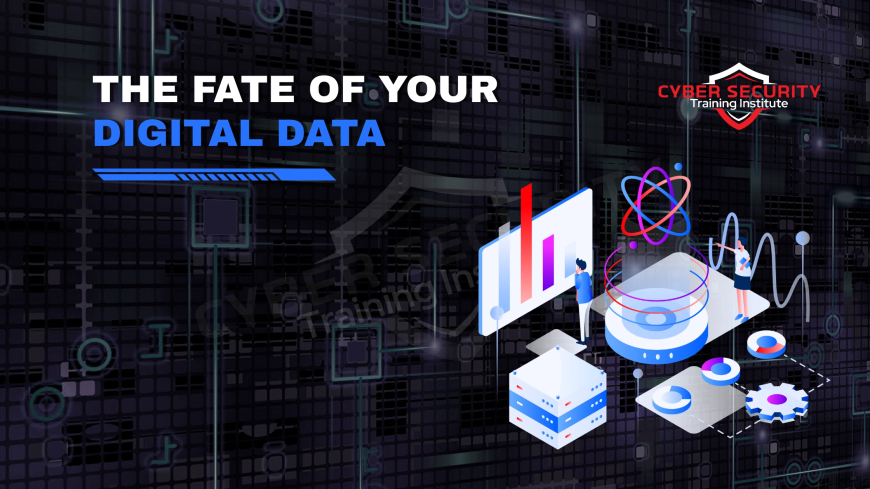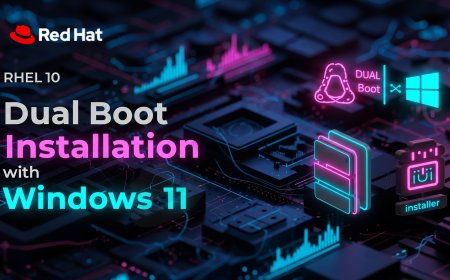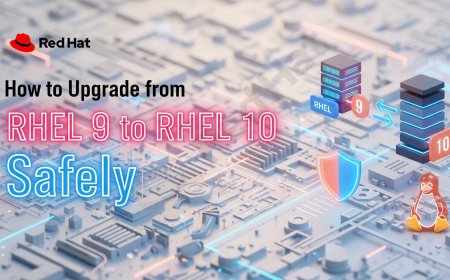Digital Afterlife | What Happens to Your Data When You Die?
Imagine this: you’ve spent years curating your online presence—photos on Instagram, emails in your inbox, playlists on Spotify, and even cryptocurrency in a digital wallet. But what happens to all this digital "stuff" when you’re no longer here? Your physical belongings might be passed down through a will, but your digital assets often exist in a murky, uncharted territory. Welcome to the concept of the digital afterlife, where your data lives on, but its fate depends on planning, policies, and sometimes a bit of luck. In today’s hyper-connected world, our digital footprints are vast and complex. From social media accounts to cloud storage, our online lives are a significant part of who we are. Yet, many of us don’t consider what happens to this data after we pass away. This blog post explores the digital afterlife, shedding light on what happens to your data, how to plan for it, and why it matters.

Table of Contents
- What Is a Digital Afterlife?
- Types of Digital Assets
- Challenges of Managing Digital Assets After Death
- Major Platform Policies on Deceased Users’ Accounts
- Planning Your Digital Afterlife
- Legal Considerations
- Conclusion
- Frequently Asked Questions
What Is a Digital Afterlife?
Your digital afterlife refers to the existence and management of your digital assets after you pass away. Digital assets include everything from your social media profiles to online banking accounts, emails, photos, videos, and even virtual currencies like Bitcoin. Unlike physical items, digital assets are often stored in the cloud, protected by passwords, or governed by terms of service agreements, making their management after death a unique challenge.
Think of your digital afterlife as a virtual estate. Just as you’d decide who inherits your house or jewelry, you need to plan for who controls your online accounts or digital memories. Without a plan, your loved ones might struggle to access cherished photos, important documents, or even financial accounts. Worse, your data could fall into the wrong hands or be lost forever.
Why does this matter? For one, our digital lives are deeply personal. Photos, messages, and creative works often hold sentimental value. Additionally, some digital assets, like cryptocurrency or online businesses, have significant financial worth. Planning for your digital afterlife ensures your legacy is preserved and your assets are handled as you wish.
Types of Digital Assets
Your digital footprint is likely larger than you realize. Here’s a breakdown of common digital assets:
- Social Media Accounts: Profiles on platforms like Facebook, Instagram, X, and LinkedIn.
- Email Accounts: Gmail, Outlook, or Yahoo accounts containing personal and professional correspondence.
- Cloud Storage: Files stored on Google Drive, Dropbox, or iCloud, including photos, videos, and documents.
- Financial Accounts: Online banking, PayPal, cryptocurrency wallets, or investment platforms.
- Subscriptions and Memberships: Streaming services like Netflix, Spotify, or even gym memberships tied to online accounts.
- Creative Works: Blogs, YouTube channels, or digital art portfolios.
- Gaming Accounts: Profiles on platforms like Steam or PlayStation Network with purchased games or virtual items.
Each of these assets may have emotional, financial, or practical value, making it critical to consider their fate after you’re gone.
Challenges of Managing Digital Assets After Death
Managing digital assets after someone passes away isn’t straightforward. Here are some key challenges:
- Access Barriers: Most accounts are password-protected, and platforms often restrict access to protect user privacy. Without login details, loved ones may be locked out.
- Platform Policies: Companies have varying rules about what happens to accounts after a user’s death. Some allow access to designated contacts; others don’t.
- Legal Uncertainty: Laws governing digital assets are still evolving, and they differ by country. This can complicate access to accounts or data.
- Data Volume: The sheer amount of data—think thousands of emails or photos—can overwhelm executors trying to manage it.
- Emotional Toll: Sorting through a loved one’s digital life can be emotionally draining, especially when uncovering personal messages or memories.
These challenges highlight the need for proactive planning to ensure your digital assets are handled smoothly.
Major Platform Policies on Deceased Users’ Accounts
Different platforms have different approaches to handling accounts after a user’s death. Below is a table summarizing the policies of some major platforms:
| Platform | Policy for Deceased Users | Options Available |
|---|---|---|
| Accounts can be memorialized or deleted upon request. | Designate a Legacy Contact to manage the account or request permanent deletion. | |
| Inactive Account Manager allows users to plan what happens to their data. | Share data with trusted contacts or delete account after inactivity. | |
| Apple | Digital Legacy program allows access to data for designated contacts. | Assign a Legacy Contact to access iCloud data after death. |
| X | Accounts can be deactivated upon request from authorized persons. | Family members can request account removal with proper documentation. |
| Microsoft | Accounts can be closed by next of kin. | Submit a request with legal documentation for account closure. |
Always check the latest policies, as they can change. Many platforms require legal documentation, like a death certificate, to process requests.
Planning Your Digital Afterlife
The good news? You can take steps now to ensure your digital assets are handled according to your wishes. Here’s how:
- Create a Digital Will: List all your digital accounts, including usernames and passwords, in a secure document. Specify what should happen to each (e.g., delete, memorialize, or transfer).
- Use Platform Tools: Set up features like Google’s Inactive Account Manager or Facebook’s Legacy Contact to designate who can manage your accounts.
- Store Passwords Securely: Use a password manager to store login details and share access with a trusted person. Avoid writing passwords in unsecured places.
- Communicate Your Wishes: Talk to your family or executor about your digital assets and how you want them handled.
- Consider a Digital Executor: Appoint someone tech-savvy in your will to manage your digital estate.
- Back Up Important Data: Download critical files, like photos or documents, to an external drive to ensure they’re accessible offline.
Planning doesn’t have to be complicated, but it does require some effort. Start small by listing your most important accounts and their purposes.
Legal Considerations
The legal landscape for digital assets is still developing, but here are some key points to understand:
- Ownership vs. Access: You may "own" your data, but terms of service agreements often limit what you can pass on. For example, you don’t own the music in your Spotify account, just the license to use it.
- Jurisdiction: Laws vary by country. In the U.S., the Uniform Fiduciary Access to Digital Assets Act (UFADAA) allows fiduciaries to access digital assets, but not all states have adopted it.
- Privacy Laws: Platforms prioritize user privacy, which can restrict access for loved ones without explicit permission.
- Estate Planning: Including digital assets in your will or trust can clarify your intentions, but you’ll need to ensure compliance with platform policies.
Consulting an estate planning attorney can help you navigate these complexities and ensure your digital assets are included in your estate plan.
Conclusion
Your digital afterlife is an extension of your legacy, encompassing everything from cherished memories to valuable assets. Without a plan, your data could be lost, locked away, or mishandled, leaving loved ones with unnecessary challenges. By understanding the types of digital assets, platform policies, and legal considerations, you can take control of your digital legacy. Start today by creating a digital will, using platform tools, and communicating your wishes to those you trust. A little planning goes a long way in ensuring your digital afterlife is handled with care.
Frequently Asked Questions
What is a digital afterlife?
It’s the existence and management of your digital assets, like social media accounts, emails, and online files, after you pass away.
Why should I care about my digital assets?
Digital assets can have emotional or financial value, and without planning, they may be inaccessible or lost after your death.
What are digital assets?
They include social media profiles, email accounts, cloud storage, financial accounts, subscriptions, and creative works stored online.
Can my family access my accounts after I die?
It depends on the platform’s policies and whether you’ve shared access details or used tools like Legacy Contacts.
What is a digital will?
A document listing your digital accounts, login details, and instructions for what should happen to them after you pass away.
How do I create a digital will?
List your accounts, passwords, and wishes in a secure document, and share it with a trusted person or include it in your estate plan.
What is a Legacy Contact?
A person you designate on platforms like Facebook or Apple to manage your account after your death.
Can I delete my accounts before I die?
Yes, you can manually delete accounts or set up tools like Google’s Inactive Account Manager to delete them after inactivity.
What happens to my email after I die?
Without a plan, emails may remain inaccessible unless your provider allows a designated contact to access or delete the account.
Can my family access my cryptocurrency?
Only if they have your private keys or wallet access. Without these, the funds are likely lost forever.
What is Google’s Inactive Account Manager?
A tool that lets you decide what happens to your Google account data after a period of inactivity, like sharing or deleting it.
Do I need a lawyer for my digital assets?
Not always, but an estate planning attorney can help ensure your digital assets are legally included in your will or trust.
Can I back up my digital data?
Yes, download important files like photos or documents to an external drive or share them with trusted contacts.
What happens to my social media accounts?
They can be memorialized, deleted, or left inactive, depending on the platform’s policy and your instructions.
Are digital assets covered by my will?
They can be, but you need to explicitly include them and provide access details, as wills don’t automatically cover digital assets.
What is the Uniform Fiduciary Access to Digital Assets Act?
A U.S. law allowing fiduciaries to access digital assets, though not all states have adopted it.
Can platforms refuse access to my data after I die?
Yes, if their terms of service or privacy policies don’t allow access, even with legal documentation.
How do I choose a digital executor?
Pick someone tech-savvy and trustworthy, and ensure they understand your wishes for your digital assets.
Can I use a password manager for my digital afterlife?
Yes, store login details in a password manager and share access with a trusted person for easy management.
What should I do today to plan my digital afterlife?
Start by listing your accounts, setting up platform tools like Legacy Contacts, and communicating your wishes to loved ones.
What's Your Reaction?
 Like
0
Like
0
 Dislike
0
Dislike
0
 Love
0
Love
0
 Funny
0
Funny
0
 Angry
0
Angry
0
 Sad
0
Sad
0
 Wow
0
Wow
0

















